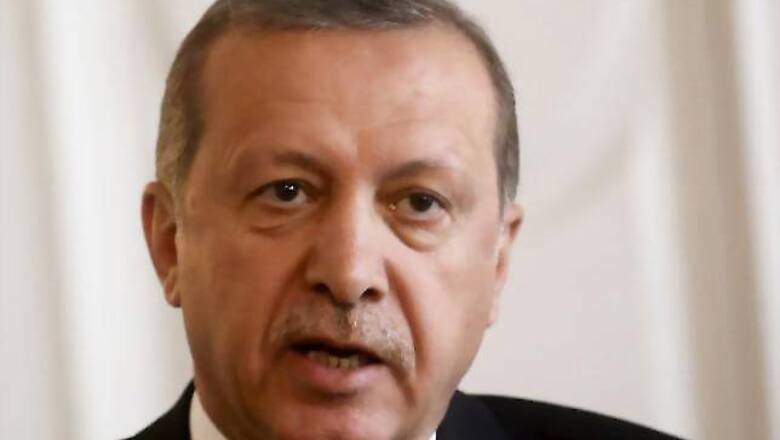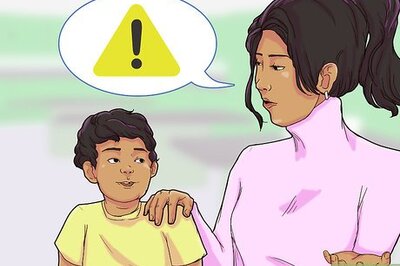
views
Ankara/ Dubai: Turkish President Tayyip Erdogan denounced the isolation of Qatar by neighbouring states as a violation of Islamic values and tantamount to a "death penalty" against Doha in a crisis reverberating through the Middle East and beyond.
Erdogan's comments marked the strongest intervention yet by a powerful regional ally of Doha eight days after Saudi Arabia, the United Arab Emirates (UAE), Bahrain and Egypt cut ties with Qatar and imposed stringent economic sanctions on it.
Qatar denies the allegations of supporting Islamist militants and Iran.
The measures against Qatar, a small oil and gas exporter with a population of 2.7 million people, have disrupted imports of food and other materials and caused some foreign banks to scale back business.
Qatar, which imported 80 percent of its food from bigger Gulf Arab neighbours before the diplomatic shutdown, has also been talking to Iran and Turkey to secure food and water.
"A very grave mistake is being made in Qatar, isolating a nation in all areas is inhumane and against Islamic values. It's as if a death penalty decision has been taken for Qatar," Erdogan told members of his ruling AK Party in Ankara.
"Qatar has showed the most decisive stance against terrorist organisation Islamic State alongside Turkey. Victimising Qatar through smear campaigns serves no purpose."
Turkey has maintained good relations with Qatar as well as several of its Gulf Arab neighbours. Turkey and Qatar have both provided support for the Muslim Brotherhood in Egypt and backed rebels fighting to overthrow Syrian President Bashar al-Assad.
Gulf Arab states have issued no public demands; but a list that has been circulating includes severance of diplomatic relations with Iran, expulsion of all members of the Palestinian Hamas group and of the Muslim Brotherhood, the freezing of all bank accounts of Hamas members, ending support for “terrorist organizations” and ceasing interference in Egyptian affairs.
Some analysts say demands could also include closing down satellite channel Al Jazeera, or changing its editorial policy.
"The parties are still defining what it is they want out of this confrontation...It's difficult to conduct negotiations if you don't really know what everybody wants. So there is an assessment phase going on right now."
Qatari Foreign Minister Sheikh Abdulrahman al-Thani said on Monday Doha "still had no clue" why Arab states had cut ties with his country. He denied Doha supported groups like the Muslim Brotherhood that its neighbours oppose, or had warm ties with their enemy Iran.INTERNATIONAL DIPLOMACY
Turkish Foreign Minister Mevlut Cavusoglu said Erdogan would discuss the Gulf rift in a telephone call with U.S. President Donald Trump in coming days, but gave no specific time.
Turkey last week approved plans to deploy more troops to a military base it has established in Qatar under a 2014 agreement with the Gulf Arab state. The move was seen as support by regional power and NATO member Turkey to Doha.
In Moscow, the Kremlin said President Vladimir Putin and Saudi Arabia's King Salman discussed the Qatar crisis in a phone call on Tuesday. The Kremlin said that the row was not helping to unite efforts to try to find a Syria settlement or fight terrorism.
Morocco has also waded into the crisis, announcing it was sending plane-loads of food supplies to Doha as part of its Islamic duty during Ramadan.
Morocco's Foreign Minister Nasser Bourita was also in the Gulf on a mission by King Mohammed to try to mediate.
A diplomatic source in the region said Bourita had met with Abu Dhabi Crown Prince Sheikh Mohammed bin Zayed al-Nahayan in Abu Dhabi on Monday and was due in Kuwait on Tuesday. He was also expected to fly to Jeddah for talks with Saudi officials on the crisis.
So far, the measures against Qatar do not seem to have caused serious shortages of supplies in shops.
Some people have even joked about being "blockaded" inside the world's richest country: a Twitter page called "Doha under siege" pokes fun at the prospect of readying "escape yachts", stocking up on caviar and trading Rolex watches for espresso.
But an economic downturn could have more dire consequences for the vast majority of Qatar's 2.7 million residents, who are not citizens but foreign workers.




















Comments
0 comment